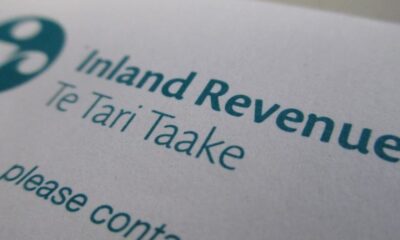Business
Navigating Tax Deductions for Investments: Key Insights from Experts

Individuals seeking to optimize their tax benefits on investments can find clarity in recent discussions led by financial experts. The new podcast series, No Stupid Questions, hosted by Susan Edmunds, has opened the floor for inquiries about financial matters, including tax deductions related to investments. A common query involves what non-business expenses can be claimed to reduce tax on investment income.
Understanding Claims on Investment Income
According to the Inland Revenue Department (IRD) of New Zealand, taxpayers earning income from sources that have already been taxed, such as salaries or investment income, can claim certain non-business expenses. Yet, the specifics can be confusing. For instance, questions arise regarding whether fees paid to the New Zealand Shareholders Association or subscriptions to financial magazines qualify as deductible expenses.
Oliver Mander, the chief executive of the New Zealand Shareholders Association, clarified that eligibility for deductions hinges on whether an individual is generating taxable income from their investments. “If you are making taxable income, you can claim expenses that help generate that income, which may reduce the tax you owe,” he explained. Conversely, if a person is not generating taxable income, they likely cannot claim such expenses.
For those with a primary income subject to Pay As You Earn (PAYE) tax, deductions may be possible for any taxable income earned outside their main job. In situations involving employment-related expenses, those should generally be claimed through the employer, who can then apply them against their business income for tax purposes.
Key Tax Regulations to Consider
Robyn Walker, a tax partner at Deloitte, emphasized two essential points regarding tax deductions. “Deductions can be claimed for costs incurred in deriving income or conducting a business that generates taxable income,” she stated. This principle is outlined in Section DA 1 of the Income Tax Act 2007. However, there are limitations; specifically, expenses that are private or related to earning income from employment are not deductible, as detailed in Section DA 2.
This means that common expenses, such as purchasing work attire or commuting costs, typically do not qualify for deduction. Nevertheless, certain exceptions exist. Sole traders and contractors may have different rules regarding claims. For instance, while private limitations can restrict claims for clothing or food, those working from a home office or using a vehicle for work purposes may indeed claim relevant deductions.
When considering investment-related expenses, there are provisions for deductions associated with borrowing costs for buying shares, further outlined in Section DA 5 of the Act.
In related discussions, questions regarding the KiwiSaver scheme have surfaced, particularly concerning asset implications in the event of needing residential care. A common concern arises when one partner requires care, and the other is over 65 years old. If both partners have individual KiwiSaver accounts, individuals often wonder if these funds are considered relationship property and must be used for care expenses.
According to Edmunds, “If either of you needs rest home care, you will only be eligible for a rest home subsidy if you have joint assets of either $291,825 or less, or $159,810 if excluding your family home and car.” This indicates that couples may need to deplete their KiwiSaver accounts until they reach the subsidy threshold. Previous attempts to set up trusts for asset protection in this context have proven largely ineffective unless there are other valid reasons for establishing the trust.
These insights underline the importance of understanding the nuances of tax deductions and the implications of personal finances in retirement planning. For those interested in further exploring these topics, the podcast No Stupid Questions offers a platform for listeners to engage and have their financial queries addressed.
For ongoing updates and guidance on managing money, individuals can subscribe to the weekly newsletter, Money with Susan Edmunds, which covers a range of financial matters affecting investment and expenditure decisions.
-

 Sports2 months ago
Sports2 months agoNetball New Zealand Stands Down Dame Noeline Taurua for Series
-

 Entertainment2 months ago
Entertainment2 months agoTributes Pour In for Lachlan Rofe, Reality Star, Dead at 47
-

 Entertainment3 weeks ago
Entertainment3 weeks agoNew ‘Maverick’ Chaser Joins Beat the Chasers Season Finale
-

 Sports2 months ago
Sports2 months agoSilver Ferns Legend Laura Langman Criticizes Team’s Attitude
-

 Politics4 weeks ago
Politics4 weeks agoNetball NZ Calls for Respect Amid Dame Taurua’s Standoff
-

 Entertainment2 months ago
Entertainment2 months agoKhloe Kardashian Embraces Innovative Stem Cell Therapy in Mexico
-

 World3 months ago
World3 months agoPolice Arrest Multiple Individuals During Funeral for Zain Taikato-Fox
-

 Sports2 months ago
Sports2 months agoGaël Monfils Set to Defend ASB Classic Title in January 2026
-

 Entertainment1 month ago
Entertainment1 month agoTyson Fury’s Daughter Venezuela Gets Engaged at Birthday Bash
-

 Sports1 month ago
Sports1 month agoHeather McMahan Steps Down as Ryder Cup Host After Controversy
-

 World1 week ago
World1 week agoSevere Winds Hit New Zealand, Over 100 Flights Canceled
-

 Entertainment1 month ago
Entertainment1 month agoTyson Fury’s Daughter Venezuela Gets Engaged at Birthday Bash















